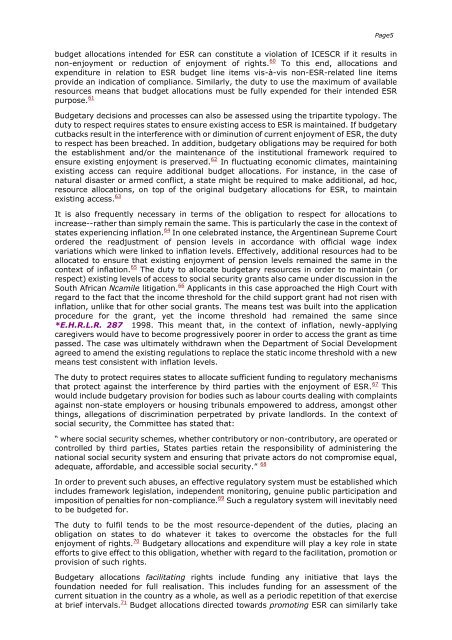Nolan_Dutschke_EHRLR
Create successful ePaper yourself
Turn your PDF publications into a flip-book with our unique Google optimized e-Paper software.
Page5<br />
budget allocations intended for ESR can constitute a violation of ICESCR if it results in<br />
non-enjoyment or reduction of enjoyment of rights. 60 To this end, allocations and<br />
expenditure in relation to ESR budget line items vis-à-vis non-ESR-related line items<br />
provide an indication of compliance. Similarly, the duty to use the maximum of available<br />
resources means that budget allocations must be fully expended for their intended ESR<br />
purpose. 61<br />
Budgetary decisions and processes can also be assessed using the tripartite typology. The<br />
duty to respect requires states to ensure existing access to ESR is maintained. If budgetary<br />
cutbacks result in the interference with or diminution of current enjoyment of ESR, the duty<br />
to respect has been breached. In addition, budgetary obligations may be required for both<br />
the establishment and/or the maintenance of the institutional framework required to<br />
ensure existing enjoyment is preserved. 62 In fluctuating economic climates, maintaining<br />
existing access can require additional budget allocations. For instance, in the case of<br />
natural disaster or armed conflict, a state might be required to make additional, ad hoc,<br />
resource allocations, on top of the original budgetary allocations for ESR, to maintain<br />
existing access. 63<br />
It is also frequently necessary in terms of the obligation to respect for allocations to<br />
increase--rather than simply remain the same. This is particularly the case in the context of<br />
states experiencing inflation. 64 In one celebrated instance, the Argentinean Supreme Court<br />
ordered the readjustment of pension levels in accordance with official wage index<br />
variations which were linked to inflation levels. Effectively, additional resources had to be<br />
allocated to ensure that existing enjoyment of pension levels remained the same in the<br />
context of inflation. 65 The duty to allocate budgetary resources in order to maintain (or<br />
respect) existing levels of access to social security grants also came under discussion in the<br />
South African Ncamile litigation. 66 Applicants in this case approached the High Court with<br />
regard to the fact that the income threshold for the child support grant had not risen with<br />
inflation, unlike that for other social grants. The means test was built into the application<br />
procedure for the grant, yet the income threshold had remained the same since<br />
*E.H.R.L.R. 287 1998. This meant that, in the context of inflation, newly-applying<br />
caregivers would have to become progressively poorer in order to access the grant as time<br />
passed. The case was ultimately withdrawn when the Department of Social Development<br />
agreed to amend the existing regulations to replace the static income threshold with a new<br />
means test consistent with inflation levels.<br />
The duty to protect requires states to allocate sufficient funding to regulatory mechanisms<br />
that protect against the interference by third parties with the enjoyment of ESR. 67 This<br />
would include budgetary provision for bodies such as labour courts dealing with complaints<br />
against non-state employers or housing tribunals empowered to address, amongst other<br />
things, allegations of discrimination perpetrated by private landlords. In the context of<br />
social security, the Committee has stated that:<br />
“ where social security schemes, whether contributory or non-contributory, are operated or<br />
controlled by third parties, States parties retain the responsibility of administering the<br />
national social security system and ensuring that private actors do not compromise equal,<br />
adequate, affordable, and accessible social security.” 68<br />
In order to prevent such abuses, an effective regulatory system must be established which<br />
includes framework legislation, independent monitoring, genuine public participation and<br />
imposition of penalties for non-compliance. 69 Such a regulatory system will inevitably need<br />
to be budgeted for.<br />
The duty to fulfil tends to be the most resource-dependent of the duties, placing an<br />
obligation on states to do whatever it takes to overcome the obstacles for the full<br />
enjoyment of rights. 70 Budgetary allocations and expenditure will play a key role in state<br />
efforts to give effect to this obligation, whether with regard to the facilitation, promotion or<br />
provision of such rights.<br />
Budgetary allocations facilitating rights include funding any initiative that lays the<br />
foundation needed for full realisation. This includes funding for an assessment of the<br />
current situation in the country as a whole, as well as a periodic repetition of that exercise<br />
at brief intervals. 71 Budget allocations directed towards promoting ESR can similarly take


